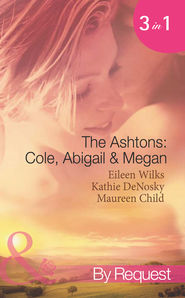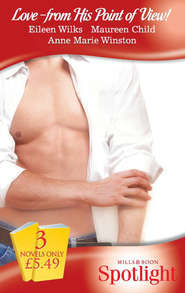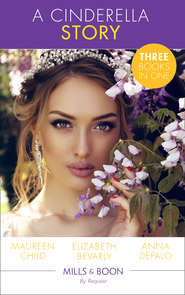По всем вопросам обращайтесь на: info@litportal.ru
(©) 2003-2025.
✖
Society Wives: Love or Money: The Bought-and-Paid-for Wife
Автор
Год написания книги
2019
Настройки чтения
Размер шрифта
Высота строк
Поля
That plea still had his conscience tied in knots a week later.
Instead of working, he found himself driving out of town and into the sprawling midcountry estates, heading for White Birch Lane and a score of knotted intangibles. He needed facts. He needed truths.
Not only about Vanessa, but about the father he’d not spoken to since he left Eastwick as a twelve-year-old.
Focused on that result, he didn’t consider the early hour until he was driving up to the closed and silent mansion. It was too early for her to be gone for the day but not too early, he discovered, to find her in the garden.
The morning sun was less than an hour old, its light as pale as her hair. As diaphanous as the shell-pink sweep of nothing that shaped her body. The image was soft and ethereal, an artist’s rendition of Girl with Flowers, and Tristan stood transfixed by her beauty for a minute too long. Twenty yards of lawn and several bays of massed rose bushes away, he sensed her sudden stillness and the shock in her eyes when his presence registered.
The polite thing to do was acknowledge her, maybe with a teasing remark about wandering the grounds in her negligée, then retreat so she could dress in something more … substantial. The sensible thing was to turn on his heel and get the hell out of there without taking any more notice about what she was wearing or not wearing.
But he had noticed. His body ached with its impolite and not-sensible response to noticing.
The best he could do was keep a bed of rose bushes between them as he approached, an extra thorny-branched barrier to the one he was busy erecting in his mind.
She’s out of bounds. She loved your father. She was his wife for five years.
No matter what resulted from their legal wrangle, from the letter’s allegations, from his investigations, she could never be his.
The massed shrubs shielded much of her body from view, but it didn’t help. He could still see her face, her throat, the skin framed by lace at her shoulders and breasts. And he could see what had brought her out of doors so early.
One of her gloved hands held a bunch of long-stemmed blooms; the other wielded a pair of lethal-looking shears. The part of his body that had noticed the diaphanous nightdress and the shape of her body beneath took due note.
“I hope I didn’t startle you too much. Those things—” he inclined his head to indicate the shears “—look like they could do serious damage.”
“I heard you drive up, so no.”
“Yet you looked surprised.”
“I thought you were Gloria, arriving early.”
Her accompanying shrug caused her negligee’s deep neckline to dip, and Tristan’s hand itched to reach out and slide it back into place. With a silent curse he shoved both hands in his pockets, out of temptation’s way. “I’m not Gloria.”
“No,” she said, as soft as the morning. “You’re not.”
Their gazes meshed for what felt like a long time. He could feel the pulse of attraction between them, a silent energy that hummed in the summer’s morning. She felt it too—he could see it in her eyes and in the slight flush of her cheeks.
Hell. She felt it too.
He buried his hands deeper in his shorts. “I should have called first.”
“It’s fine, really.”
“Really?”
“You saved me a phone call.” A frown of concentration formed between her brows and turned her eyes serious. “I wanted to talk to you about what I said yesterday … or what I didn’t say.”
“About?”
“Your father. The will. I’m not backing down on anything I said, but on my way home yesterday and last night and this morning I was thinking—” She paused and although her eyes were clear, the dark smudges beneath flagged her lack of sleep. “I may have given the impression that Stuart didn’t want you to have anything. That is not true.”
“He left me a thousand bucks. To show he hadn’t forgotten me.”
“That was the lawyers’ doing and not what I meant. He would have made you a beneficiary, Tristan, if you’d come to see him when he asked.”
“Guess I must have missed that.”
“I guess so,” she said with a damn-you note to her voice. With great care she snipped off another pink bud and added it to her collection. The petals quavered—because her hands were shaking?—and when she looked up again, her eyes glistened with moisture. “Ignoring his letter, not even bothering to reply—that was just plain cruel, Tristan. He was your father and he was dying. Would it have hurt to swallow your pride and pick up the phone?”
Hit hard by the husky edge to her voice and the sheen of emotion in her eyes, it took a moment for the words and the message to register. Then everything inside him went still. “What letter?”
“He wanted to see you or at least to speak to you, to explain his side of the story. I suggested he write—that he might find that easier than trying to explain over the phone.”
“And he sent it?”
“I posted it myself.” She stared back at him, at first with that same hard edge as earlier and then with slowly dawning comprehension. “You really didn’t receive it, did you? And when I tried to call …”
He’d deliberately stonewalled her, not taking the calls and then not returning her increasingly insistent messages until it was too late. His father had passed away an hour before.
What-might-have-been frustration swelled inside him, tightening his chest, his throat, his expression. “If he wanted to talk to me so badly, why the hell did he leave it so late?”
“Because he was as proud and as stubborn as you! He poured his heart and his soul into that letter and when you didn’t reply, when he got nothing but stony silence, he gave up.”
“But you didn’t.”
In her eyes, he saw that truth. She’d pushed Stuart to write the letter. And she’d made those calls when his father was hospitalized, a last ditch effort to reconcile them: the husband she’d loved and his only child.
“That’s when he made up his mind about the will.” Carefully she closed the shears and clicked the safety lock into place. The metallic snick punctuated the finality of his father’s decision. Closed, done, ended. “He said you’d made your own life in Australia. You were a success. You didn’t need his money and you didn’t need him.”
She was right. At thirty his time of needing a father had long passed into a faded, bitter memory of the years when he’d silently yearned for that support. Even if he had read the letter or if he’d taken her calls, he doubted it would have led to anything but cold, hard words. “Too little, too late.”
For a moment he thought she might dispute that, but then she changed tack—he saw the switch in her expression and the set of her mouth as she gathered up her bunch of cut roses and started to move off. “You might not believe this,” she said, “but he never forgot you were his son. He told me once how glad he was that your football career took off, because that made it so easy to keep up the connection. The more your star rose, the more stories he found in the press.”
“His son, the famous footballer.”
A vehement spark lit her eyes. “It wasn’t like that, Tristan! Of course he was proud of your success—what parent wouldn’t be? But this was about knowing some part of you, about having that connection. He learned all about your Aussie Rules game and he read all the match reports and stats. He watched the games on cable.
“One night I found him sitting in the dark, in the theater room where he watched the games. And the television was showing, I don’t know, ice-skating or rhythmic gymnastics or something I knew he wouldn’t watch. I thought he’d gone to sleep so I turned on the light to rouse him and send him back to bed.”
She paused in a gap between two heavily-laden bushes, her expression as soft as the mass of creamy-pink roses that framed her slender curves. And, damn it her eyes had gone all dewy again. He braced himself, against the punch-to-the-heart sensation the sight of her caused and against whatever she was about to tell him.
“He didn’t turn around because he didn’t want me to see his tears, but I heard them in his voice. I knew he was sitting there in the dark crying. He told me later that you’d been playing your two hundredth game and they’d run a special on you during the halftime break. He was so proud and I was so damn mad at you both for not doing something about your rift.”
Rift? The gap between him and his father had been more in the scope of a canyon. If there’d ever been any chance of bridging it … “That was up to him.”
“Would you have listened?”
For several seconds they stood, gazes locked, the atmosphere taut with that one telling question. And when he didn’t answer, she shook her head sadly. “I didn’t think so.”
Другие электронные книги автора Maureen Child
Vanished




 0
0











